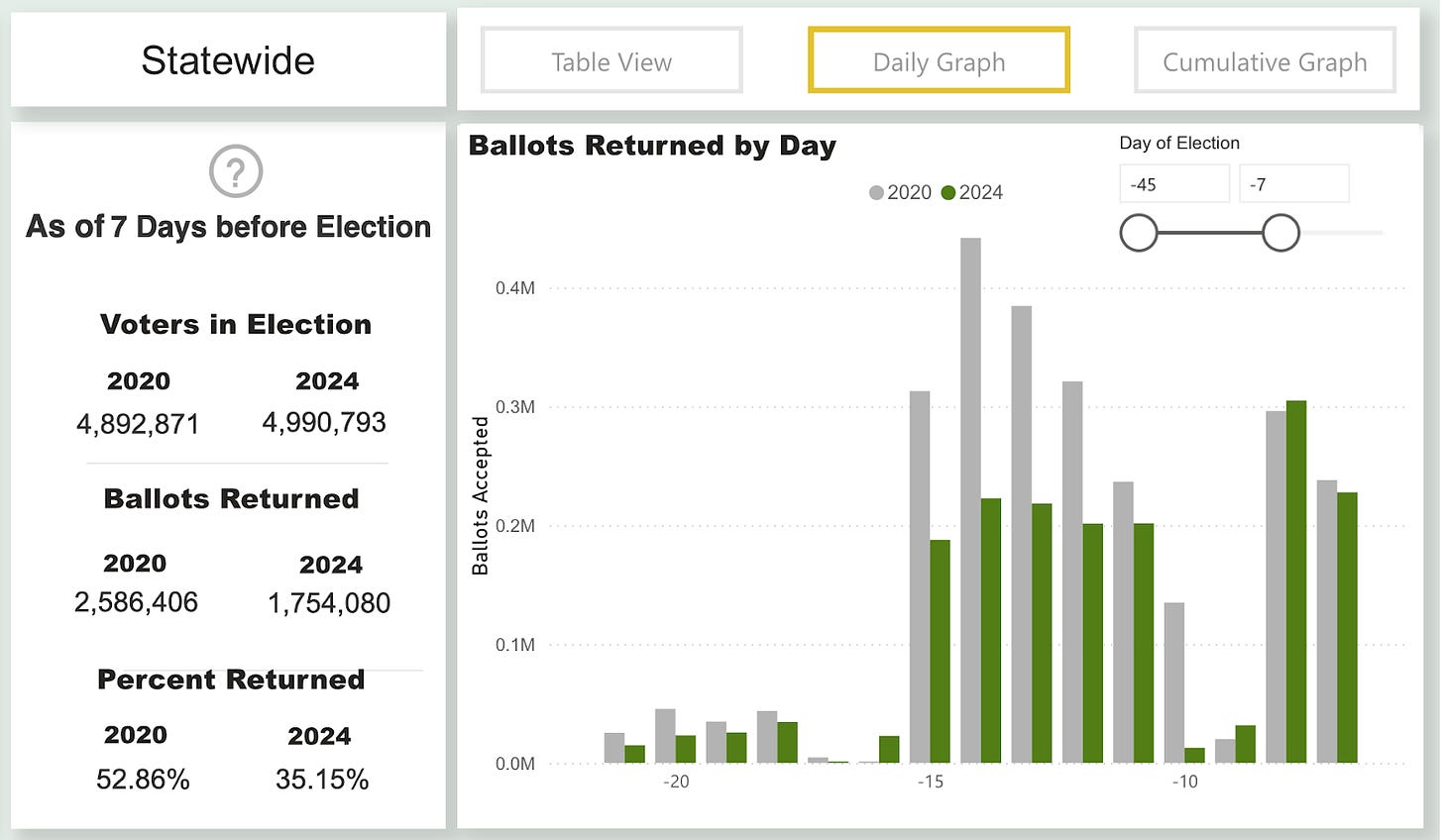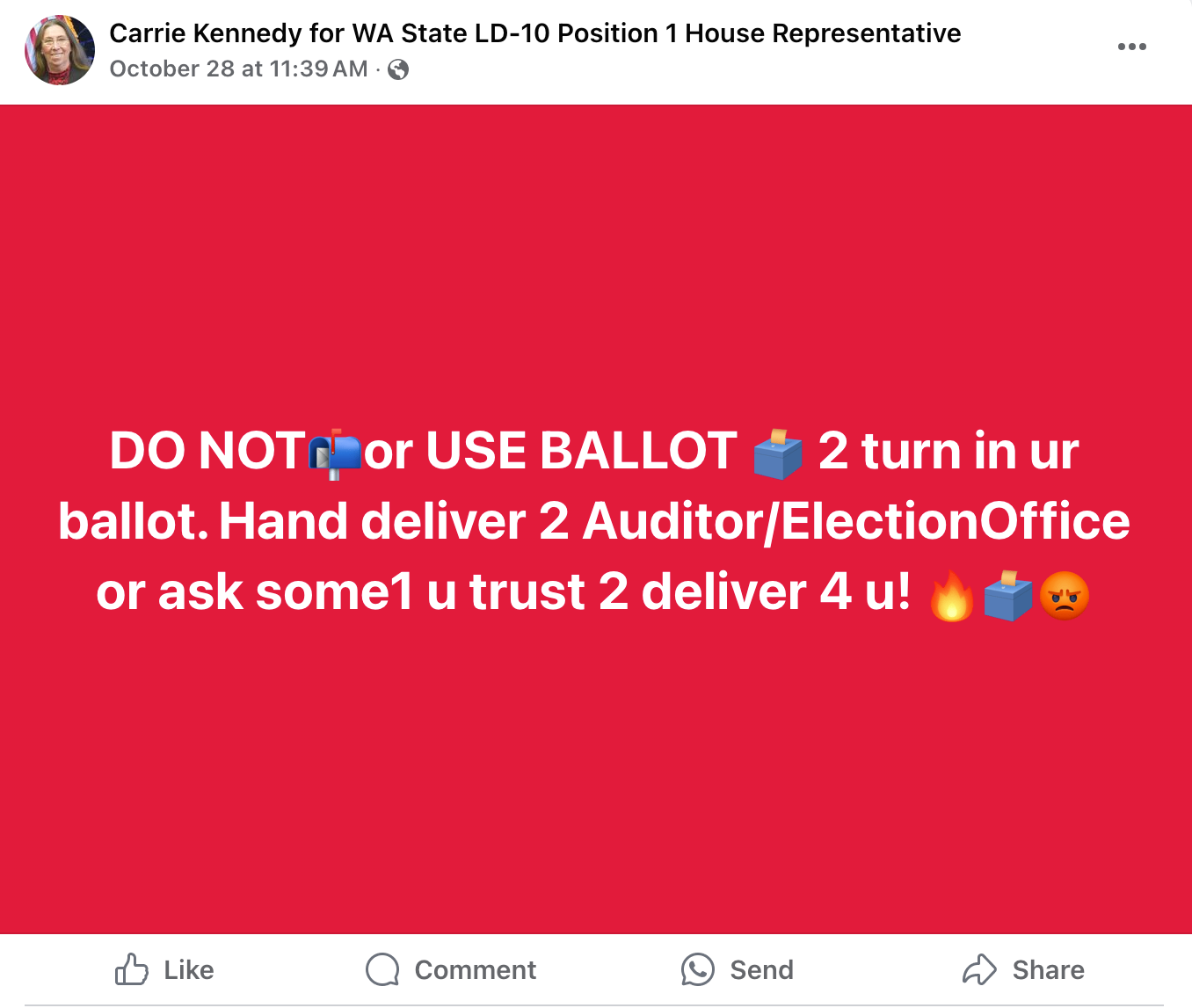A splashy campaign against cutting wage theft enforcement
Plus more campaign cash in the 10th, revealing numbers on early voting, and some recommended reading
The top of Tuesday morning’s homepage of The Seattle Times looked like this—at least if you were reading from the kitchen at Observer World Headquarters on Vashon Island:
That banner ad at the top is a piece of “grassroots lobbying,” which is an attempt to influence government via direct outreach to the public. In this case, it’s SEIU 775, the powerful long-term care workers union, trying to persuade the Seattle City Council not to cut the budget of the city’s Office of Labor Standards. The office enforces various local ordinances to protect workers’ rights, including protections against wage theft. Click on the banner and you wind up on a webpage that encourages you to send a prepared but customizable message to the city council.1 In theory, a flood of such messages can influence the council’s decision.
The city’s facing a big revenue shortfall, which means the budget knives are out in general. The Office of Labor Standards is in line to lose more than $600,000 from its current budget of about $9 million per year. The $600K cut means losing three enforcement and outreach workers and hundreds of thousands of dollars in outreach and education spending aimed at helping businesses and workers understand the law.
The office says it has returned $46 million to more than 88,000 workers since its inception in 2015. SEIU is in this fight because wage theft is apparently a thing in that industry and they’d like the city to keep on top of making sure people get paid.
We’re told the ad in the Times was part of a larger campaign to drive public input to the council. SEIU 775 owes a disclosure on the spending to the Seattle Ethics and Elections Commission, but it’s not due until next month.
PQ
Either we’re voting less, or we’re voting later
As of this morning, about 1.7 million voters had cast their ballots in Washington, roughly 35% of the ballots mailed out. No biggie, right? There’s still a week to go. But here’s the thing: Four years ago, more than 2.5 million votes were cast with a week to go, or about 53% early turnout. Check out the stats here.
So what gives? Are people still scratching their heads over Kamala Harris v. Donald Trump for president or Dave Reichert v. Bob Ferguson for governor? Are people bogged down by the unusually lengthy ballot? Has the flood of campaigning against the four ballot measures prompted existential confusion? Has the toxic nature of contemporary politics driven more of us to the refuge of weed edibles and Netflix binging?
Hard to know when you’re talking about the individual decisions of 4.9 million people, but there’s one easy comparison. Decision 2020 was the COVID election, when most voters had been cooped up in their homes for the better part of a year. Returning your ballot early was something to do. For this election, we’re mostly back to normal, with the pressures of everyday life competing with the envelope of civic duty guilting you from the kitchen table.
There’s some indication that things are starting to pick up as the actual deadline approaches. All ya’ll get that ballot in.
PQ
House Republicans go on offense in 10th LD and open the door for a fringe caucus-mate
The House race in the 10th Legislative District leaves the House Republican caucus with two bad choices: Throw their support behind an election-denier and truly out-there MAGA Republican or let the Democrats inch closer to a supermajority without a fight.
A recent spend from Fix Washington, the committee representing the House Republicans’ Reagan Fund, shows the caucus will stomach the most MAGA among them if they can axe one more Democratic seat from the House.
Campaign finance records show Fix Washington spent just over $100,000 on TV and digital advertising attacking incumbent Rep. Clyde Shavers, D-Whidbey Island, in the 10th LD. The eleventh-hour opposition campaign against Shavers no doubt highlight his exaggerations of his military record and other parts of his resume that surfaced shortly before his narrow victory in 2022.
The decision to ramp up the negative campaign rhetoric around Shavers’ military record in a district so heavy with current and former service members indicates House Republicans may be resigned to a future where a Shavers loss means a victory for his opponent Carrie Kennedy—though her commitment to winning feels lukewarm if she doesn’t believe voters can trust the mailbox or ballot drop-boxes with their votes:
Kennedy has made some controversial statements on social media in the past, which we’ve written about in past editions of The Observer. In August, House Minority Leader Drew Stokesbary, R-Auburn, told the Washington State Standard the caucus would support Kennedy, but they haven’t sent her any money directly since the party’s favored candidate, military veteran Yvonne Gallardo, failed to qualify for the general.
House Republicans faced a similar Sophie’s Choice earlier in October when they gave money to former Rep. Jesse Young in the 26th LD, rather than concede Democrats another seat.
The New Direction PAC, which works to protect and maintain Democratic majorities in the state legislature, dropped $145K in independent spending against Kennedy in the 10th—nearly all of it in October. The advertising highlights some of Kennedy’s more out-there conspiracies:
We’ll see next week if voters prefer Shavers continue to represent them, or if they go for the fringiest candidate we’ve seen in a while.
SK
Recommended reading
Another changing of the guard for the Statehouse press corps
Claire Withycombe with The Seattle Times is swapping statehouse politics for the fraught world of early childhood education, which may fare a lot worse should the capital gains tax that expanded it be repealed. Washington’s preschool access happens to rank 33rd in the country.
The new beat at The Times is bankrolled by the Ballmer Group, the philanthropic enterprise of Microsoft billionaires Steve and Connie Balmer, who have spent a pretty penny supporting high-quality child care and defending the Climate Commitment Act this year.
Who the Times will have reporting from the marble halls of the capital next session is an open question. We should know in the coming weeks when the paper wraps up its candidate search.
TG
Debts come due for the Department of Corrections
Grace Deng recently followed up her eye-opening deep-dive into prison fees for the Washington State Standard with news that the Department of Corrections will finally start spending its prisoner welfare fund, at least in part.
More than $1M of the money the department pocketed from prisoners will go toward beautification projects, music programs, and other amenities at the bottom of your average prisoner’s list. It’s also just a fraction of the big pile of cash the department still sits on.
It remains to be seen if we can label this development as a cosmic coincidence since Deng forced the issue.
TG
Thanks for your attention. This is the free midweek edition of The Washington Observer, an independent newsletter on politics, government, and the influence thereof in Washington State. It’s made possible by our paid subscribers. If you’re not among them, go ahead and hit the button to get access to subscriber-only editions and the warm glow of supporting independent journalism.
A spooky dog for your midweek
Molly, bringing some serious Halloween vibes, courtesy of her human, subscriber Geoff Cole. Want to see your pet in this space? Drop us a photo and some caption material.
Ideally, these campaigns are geographically targeted for maximum effect and efficiency. While Vashon Islanders like Paul and the Woman Who Lets Him Live With Her don’t have a vote in Seattle, the island is chockablock with the kind of progressives who can be persuaded to sling some messaging the council’s way.










Paul- thanks for your comparison on ballot return rates, but I would reiterate your comments that 2020 was an exception. Most of our vote by mail elections, somewhere between 60 and 66% of total ballots are dropped in the last 96 hours, Or come in by mail during that timeframe or even later. I will be shocked if we don’t reach the levels that are projected perhaps touching into the mid to high 80s. Also, we have a greater number of infrequent voters registered, and to the extent they under perform and turn out they will drag down overall turnout. I have always been a skeptic of young people voting, no matter how hard organizations work to bring them to the polls. I do wonder if this year they will slightly over perform since so many issues are of such great effects to their generation. We will see what happens, but thank you very much for bringing this issue forward. I also greatly appreciate your coverage of campaign financing this whole cycle, even if I disagree at times with some of your emphasis. All the best, subscriber, Larry.